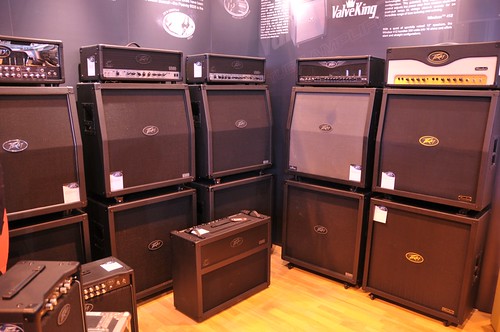Having a great electric guitar is one thing, but to have the best experience as a guitarist and have as much fun as possible with your instrument, you need a great amp, too. When choosing your guitar amp, there is much more to consider than what can fit your budget. Be sure to play around with different brands, as they all have their own unique quirks for you and any listeners to enjoy. If there’s a particular musician or band that you love the sound of, look up the gear they use online – it’s much easier than going around the shops trying to listen to every sound as you create it!
Here are some things to keep in mind when picking an amp.
How Loud do You Need It?

Most amps that we use at home are on the smaller side, as we have people who live with us and neighbours that we can’t afford to annoy to any great degree. Those of us who play gigs will often find that there’s equipment at the venue – even small pubs holding open mic or buskers nights will have amps available to use – although you might need to think about how this will influence your sound.
Different brands won’t make much difference in terms of volume, so bear in mind the following:
- Amps up to 15W are fine for at home or small gigs, and small enough for you to carry around hassle free.
- 15 – 30W amps are great for band situations as they ensure your guitar doesn’t get lost. These amps tend to have enough features for you to play around with, too, so you can perform effective sound checks and create the tone you want.
- Anything above this, right up to 100W, is very loud, and not something you’d want in your home.
Gain & Distortion
This is probably the most important aspect to consider as it is where your amp can have a real impact on the sounds you create. If you’re focused on one particular genre of music, this is important, too.
A Fender or Vox amp is great for those who want to play loud but always be pumping out a clean sound, though you can get some great rocky distortion from these, too. These amps are generally considered good “all-rounders,” so if you play a variety of styles they’re a safe choice.
Marshall is the best brand for rock and punk guitarists who want to get distortion and gain at lower volumes, while those who are extra aggressive and playing metal styles should consider a Mesa Boogie amp.
Egnater Tweaker amps are great for giving you the best of all the brands, and is a good choice to buy with a friend or housemate if you can share an amp, or for guitarists who want to experiment with their sound.
Playing Around

On top of these features, you just need to understand what all the features on each amp do, and whether or not you need them for the way you play. Hang out in the music shop and spend some time getting to know each amp, and when you find the one for you, be sure to snap it up.
Are you a guitarist? Check out our full range of online guitar lessonsAre you a saxophonist? Check out our full range of online saxophone lessons
Subscribe to Pro Music Tutor from as little as £7.99 per month
Related Posts
-
The Benefits of Online Music Education
Learning music has never been easier, since the internet and modern technological advancements have opened the doors to countless possibilities, expanding the subjects people can choose from and how the lessons are taught. Now, people can study a whole host of music-related topics; from learning to play guitar or DJing, to understanding the inner workings […]
View All >> -
Essential Jazz Guitar Scales that are Easy to Learn
Improvising in jazz requires the ability to play in different keys over different chords. Results certainly do not come overnight, but with diligent practice, you would be surprised by what you can achieve. Many people ask me about what scales I use as if they were some big secret. While knowing your scales is very […]
View All >>
Latest Blog Entries
-
The Benefits of Online Music Education
Learning music has never been easier, since the internet and modern technological advancements have opened the doors to countless possibilities, expanding the subjects people can choose from and how the lessons are taught. Now, people can study a whole host of music-related topics; from learning to play guitar or DJing, to understanding the inner workings […]
View All >> -
Essential Jazz Guitar Scales that are Easy to Learn
Improvising in jazz requires the ability to play in different keys over different chords. Results certainly do not come overnight, but with diligent practice, you would be surprised by what you can achieve. Many people ask me about what scales I use as if they were some big secret. While knowing your scales is very […]
View All >>
Blog Categories
- Categories
- Guitar Tips (93)
- History (36)
- How-To (38)
- Interviews (3)
- Music Industry (121)
- Prolinks Guitar (2)
- Prolinks Lessons (3)
- Prolinks Tutor's Profile (1)
- Saxophone Tips (40)
- Uncategorized (6)
Tags
Archive
- November 2018 (1)
- February 2018 (1)
- December 2017 (1)
- November 2017 (1)
- October 2017 (1)
- July 2017 (4)
- May 2017 (2)
- April 2017 (1)
- August 2016 (2)
- July 2016 (1)
- June 2016 (2)
- May 2016 (3)

